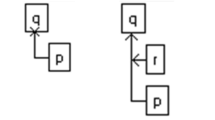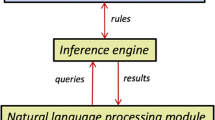Abstract
In this paper, we describe the use of legal ontologies as a basis to improve IT support for professional judges. As opposed to most legal ontologies designed so far, which are mostly based on dogmatic and normative knowledge, we emphasize the importance of professional knowledge and experience as an important pillar for constructing the ontology. We describe an intelligent FAQ system for junior judges that intensively use the ontology.
Similar content being viewed by others
Explore related subjects
Discover the latest articles, news and stories from top researchers in related subjects.References
Ayuso, M., Becue, M., Alvarez, R., Valencia, O., Alvarez, M., and Santolino, M. (2002). Anlisis Estadstico de las Encuestas a los Jueces en su Primer Destino. Technical Report 1, Escuela Judicial de Barcelona. SEC-2001-2581-C02-01/02
Bench-Capon, T. J. M. (2001). Task Neutral-Ontologies, Common Sense Ontologies and Legal Information Systems. In Proceedings of the Second International Workshop on Legal Ontologies, 13 December, University of Amsterdam, pp. 15–19
V. R. Benjamins D. Fensel S. Decker A. Gomez-Perez (1999) ArticleTitle(KA)2: Building Ontologies for the Internet: a Mid Term Report International Journal of Human Computer Studies 51 IssueID3 687–712 Occurrence Handle10.1006/ijhc.1999.0275
R. D’Andrade (1995) The Development of Cognitive Anthropology Cambridge University Press Cambridge
Gangemi A. and Breuker J. (2002). Harmonizing Legal Ontologies. In Gangemi, A., Guarino, N. and Doerr, M. (eds.), Deliverable 3,4 IST Project-2000-29243. Ontoweb
T. R. Gruber (1993) ArticleTitleA Translation Approach to Portable Ontology Specifications Know- ledge Acquisition 5 199–220 Occurrence Handle10.1006/knac.1993.1008
Grüninger, M. and Fox, M. (1995). Methodology for the Design and Evaluation of Ontologies. In Proceedings of the Workshop on Basic Ontological Issues in Knowledge Sharing Held in Conjunction with IJCAI-95. Montreal, Canada
Lebart, L., Salem, A., and Berry, L. (1998). Exploring Textual Data. Kluwer Academic Publishers
G. Miller (1995) ArticleTitleWordNet: A Lexical Database for English Communications of the ACM 38 IssueID11 39–41 Occurrence Handle10.1145/219717.219748
J. Pustejovsky (1995) The Generative Lexicon MIT Press New York
R. Schank (1990) Tell Me a Story. Narrative and Intelligence Northwestern University Press Evanston IL
Stuckenschmidt, S., Stubkjæ E. and Schlieder, C. (2001). Modeling Land Transactions: Legal Ontologies in Context. In Proceedings of the Second International Workshop on Legal Ontologies, 13 December, University of Amsterdam, pp. 58–66
P. R. S. Visser T. J. M. Bench-Capon (1998a) ArticleTitleA Comparaison of Four Ontologies for the Design of Legal Knowledge Sustems Artificial Intelligence and Law 6 27–57 Occurrence Handle10.1023/A:1008251913710
Visser, P. R. S. and Bench-Capon, T. J. M. (1998b). Ontologies in the Design of Legal Knowledge Systems; Towards a Library of Legal Domain Ontologies’. In Applied Ontology. Proceedings of the Marvin Farber Conference on Law and Institutions in Society. Department of Philisiphy, SUNY, Buffalo, 24 April
P. Vossen (Eds) (1998) EuroWordNet A Multilingual Database with Lexical Semantic Networks Kluwer Academic Publishers Dordrecht, The Netherlands
Zeleznikow, J. and Stranieri, A. (2001). An Ontology for the Construction of Legal Decision Support Systems’. In Proceedings of the Second International Workshop on Legal Ontologies, 13 December, University of Amsterdam, pp. 67–76
Author information
Authors and Affiliations
Corresponding author
Rights and permissions
About this article
Cite this article
Benjamins, V.R., Contreras, J., Casanovas, P. et al. Ontologies of Professional Legal Knowledge as the Basis for Intelligent IT Support for Judges. Artif Intell Law 12, 359–378 (2004). https://doi.org/10.1007/s10506-005-4159-9
Published:
Issue Date:
DOI: https://doi.org/10.1007/s10506-005-4159-9




